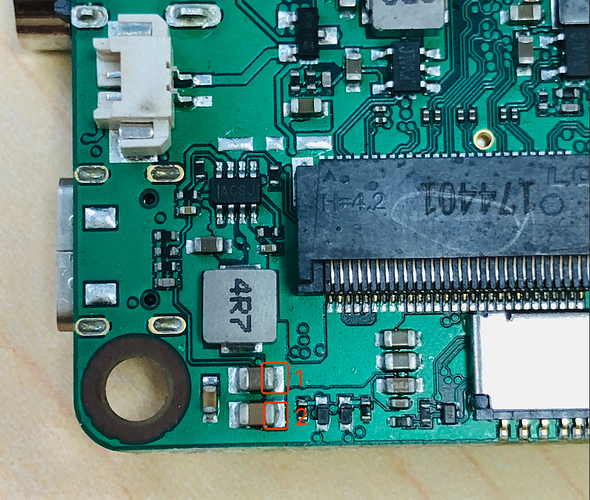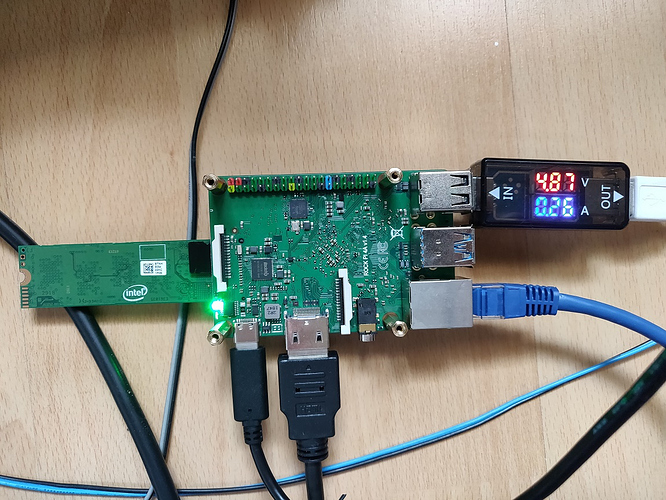Its probably answered somewhere else, cant find it.
How do i add package?
_ _ _ _ _
_ __ ___ ___| | ___ __ (_) || | | |__
| '__/ _ \ / __| |/ / '_ \| | || |_| '_ \
| | | (_) | (__| <| |_) | |__ _| |_) |
|_| \___/ \___|_|\_\ .__/|_| |_| |_.__/
|_|
Welcome to ARMBIAN 5.67 user-built Debian GNU/Linux 9 (stretch) 4.4.154-rk3399rockpi4b
System load: 0.39 0.28 0.27 Up time: 20:19 hours
Memory usage: 19 % of 3811MB IP: 192.168.1.208
CPU temp: 39°C
Usage of /: 55% of 3.4G
[ General system configuration (beta): armbian-config ]
Last login: Thu May 30 09:44:56 2019 from 192.168.1.25
rockpi@rockpi4a:~$ sudo apt-get update
[sudo] password for rockpi:
Get:2 http://security.debian.org stretch/updates InRelease [94.3 kB]
Ign:3 http://cdn-fastly.deb.debian.org/debian stretch InRelease
Get:4 http://cdn-fastly.deb.debian.org/debian stretch-updates InRelease [91.0 kB]
Get:5 http://cdn-fastly.deb.debian.org/debian stretch-backports InRelease [91.8 kB]
Hit:6 http://cdn-fastly.deb.debian.org/debian stretch Release
Hit:1 https://apt.armbian.com stretch InRelease
Get:7 http://security.debian.org stretch/updates/main arm64 Packages [472 kB]
Get:8 http://security.debian.org stretch/updates/main armhf Packages [477 kB]
Fetched 1,227 kB in 3s (370 kB/s)
Reading package lists... Done
rockpi@rockpi4a:~$ sudo apt-get install rockpi4b-rk-u-boot-latest
Reading package lists... Done
Building dependency tree
Reading state information... Done
E: Unable to locate package rockpi4b-rk-u-boot-latest
rockpi@rockpi4a:~$
Edit:
Sorry, I didt use google, only forum search 
https://wiki.radxa.com/Rockpi4/radxa-apt
And I believe I bricked Armbian bootloader
I will investigate today when I get physical access to RockPi
rockpi@rockpi4a:~$ sudo apt-get install rockpi4b-rk-u-boot-latest
Reading package lists... Done
Building dependency tree
Reading state information... Done
rockpi4b-rk-u-boot-latest is already the newest version (2017.09-00011-g0568348).
0 upgraded, 0 newly installed, 0 to remove and 0 not upgraded.
1 not fully installed or removed.
After this operation, 0 B of additional disk space will be used.
Do you want to continue? [Y/n] Y
Setting up rockchip-fstab (0.1) ...
sed: -e expression #1, char 0: no previous regular expression
mount all partitions
mount: /etc/fstab: parse error at line 3 -- ignored
mount: mount point vfat does not exist
mount: mount point vfat does not exist
mount: mount point vfat does not exist
dpkg: error processing package rockchip-fstab (--configure):
subprocess installed post-installation script returned error exit status 32
Errors were encountered while processing:
rockchip-fstab
E: Sub-process /usr/bin/dpkg returned an error code (1)
rockpi@rockpi4a:~$ /usr/local/sbin/rockpi4b_upgrade_bootloader.sh
This script requires root.
rockpi@rockpi4a:~$ sudo /usr/local/sbin/rockpi4b_upgrade_bootloader.sh
Doing this will overwrite bootloader stored on your boot device. it might break your system.
If this happens you will have to manually fix that outside of your ROCK Pi 4.
You are currently running on different board:
ROCK PI 4B
It may brick your device or the system unless
you know what are you doing.
Type YES to continue or Ctrl-C to abort.
YES


